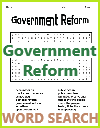Government Reform |
| www.studenthandouts.com > Social Studies > Civics > Government Reform |
 |
 |
 |
||||||||
| Gerrymandering Reading Worksheet | Government Reform Word Search Puzzle | Protest Movements Reading with Questions |
|
High school students today should have a foundational understanding of government reform, as it is a critical aspect of civic education and responsible citizenship. Here are some key topics and concepts related to government reform that high school students should be aware of.
The Purpose of Government: Students should understand the fundamental purpose of government, which is to serve and represent the interests of the people. They should learn that government reform seeks to improve the effectiveness, transparency, and responsiveness of government institutions to better fulfill this purpose. Democracy and Accountability: High school students should grasp the principles of democracy, including the role of elections, representation, and the importance of accountability. Government reform efforts often aim to strengthen democratic processes, enhance transparency, and hold elected officials accountable for their actions. Checks and Balances: Students should be familiar with the concept of checks and balances in government, which prevents any one branch or individual from accumulating too much power. They should understand how government reform can address imbalances and strengthen the separation of powers. Campaign Finance Reform: High school students should learn about campaign finance regulations and the influence of money in politics. They should understand the impact of campaign contributions on elections and governance and be aware of reform efforts aimed at reducing the influence of money in politics. Electoral Reforms: Students should be aware of electoral systems, such as first-past-the-post, proportional representation, and ranked-choice voting. They should understand how different systems can affect representation and consider reform proposals to improve the electoral process. Gerrymandering: Gerrymandering is the manipulation of electoral district boundaries for political advantage. High school students should learn about gerrymandering's impact on representation and the efforts to reform redistricting processes to ensure fairness. Voting Rights: Understanding voting rights is essential. Students should be aware of barriers to voting, such as voter suppression and voter ID laws, and the importance of protecting and expanding access to the ballot through reform efforts. Civic Engagement: High school students should recognize the importance of civic engagement and grassroots activism in driving government reform. They should learn about historical and contemporary social movements that have advocated for change. Transparency and Open Government: Transparency and open government initiatives promote access to government information and decision-making processes. Students should understand the role of transparency in holding officials accountable and consider how technology can enhance transparency. Constitutional Amendments: Students should be aware of the process of amending the U.S. Constitution and historical amendments that have shaped American governance. They should consider contemporary proposals for constitutional reforms. Civic Responsibility: High school students should recognize that they have a civic responsibility to stay informed about government reform issues, participate in discussions and debates, and, when eligible, exercise their right to vote. Global Perspectives: Students should explore government reform efforts in other countries and understand how global events and ideas can influence domestic reform discussions. Media Literacy: Given the role of media in shaping public perceptions and informing civic discourse, students should develop media literacy skills to critically evaluate information and news sources related to government reform. Overall, educating high school students about government reform is crucial for fostering an informed and engaged citizenry. It equips them with the knowledge and critical thinking skills needed to actively participate in discussions about the future of governance and advocate for positive changes in their communities and society at large. |
| www.studenthandouts.com > Social Studies > Civics > Government Reform |






